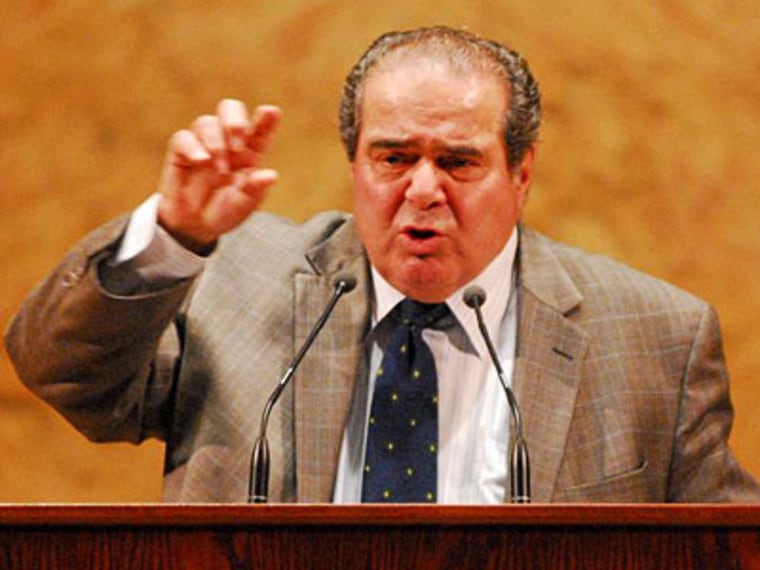Two years ago tomorrow, the U.S. Supreme Court struck down the Defense of Marriage Act, much to Justice Antonin Scalia's chagrin. Adding to his greatest-hits list, the far-right jurist called the majority's rationale "
legalistic argle-bargle."
Today, as my msnbc colleague Irin Carmon
reported, Scalia was once again in rare form today in his
King v. Burwell dissent.
Justices Antonin Scalia, Clarence Thomas and Samuel Alito dissented. Writing on their behalf, Scalia accused the majority of acting in bad faith just to save the law. "So it rewrites the law to make tax credits available everywhere. We should start calling this law SCOTUScare," Scalia wrote in the dissent. He said Roberts' reasoning was an act of "interpretive jiggery-pokery."
No, seriously. Scalia actually used the phrase "interpretive jiggery-pokery." It's
on page 8. Two pages later, he published the phrase "pure applesauce" as a complete sentence.
The justice has been
embarrassing himself with increasing frequency, but Scalia's reputation continues to deteriorate further.
The broader point, however, is less about the justice's strange word choice and more about his increasingly twisted approach to the law.
The dissent in King is literally hard to believe. On page 17 of the majority opinion, Chief Justice John Roberts even mocks the dissenters for making the opposite conclusion that they drew three years ago:
"It is implausible that Congress meant the Act to operate in this manner. See National Federation of Independent Business v. Sebelius, 567 U. S. ___, ___ (2012) (SCALIA, KENNEDY, THOMAS, and ALITO, JJ., dissenting) (slip op., at 60) ("Without the federal subsidies . . . the exchanges would not operate as Congress intended and may not operate at all.").
It's no small detail. Three years ago, when the Affordable Care Act's constitutionality was challenged, Scalia, Clarence Thomas, and Sam Alito read the law in such a way as to see all eligible consumers receiving subsidies, regardless of state or federal exchanges. In today's dissent, these three had to read the law in the polar opposite way.
And therein lies the point: it seems as if the dissenting justices were so eager to rule against "Obamacare" that they were willing to ignore legislative history, legislative intent, context, and their own beliefs from three years ago.
I'm also reminded of
this Linda Greenhouse piece from February.
Statutory interpretation is something the Supreme Court does all the time, week in and week out, term after term. And while the justices have irreconcilable differences over how to interpret the Constitution, they actually all agree on how to interpret statutory text. [...] Every justice subscribes to the notion that statutory language has to be understood in context. Justice Scalia said it from the bench just last month, during an argument about the proper interpretation of the federal Fair Housing Act. "When we look at a provision of law, we look at the entire provision of law, including later amendments," Justice Scalia said. "We try to make sense of the law as a whole." ... Across the ideological spectrum, the court's opinions are filled with comments like Justice Scalia's.
Today, Scalia threw all of that out the window, saying what matters isn't the entire provision of law, but how he could take half a sentence out of context to undermine a law he doesn't like.
"Words no longer have meaning," Scalia
whined today. In reality, words are still fine. What lacks meaning are Scalia's unhinged complaints.
